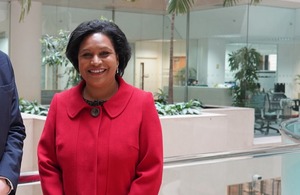New action to tackle illegal and exploitative children’s homes
Up to 200 places will be created for vulnerable children in council-run high-quality children’s homes with £53 million

The most vulnerable children in society will be better protected from unsafe, illegal children’s homes thanks to over £53 million investment from the government to create 200 new placements in high-quality council-run homes through its Plan for Change.
For the first time, the government has specifically targeted funding at children who have such complex needs that they are at risk of, or have been, deprived of their liberty.
Children in these situations need extra support from social workers and care teams to stop them running away from home and from harming themselves and others.
The new homes will break down barriers to opportunity by providing support for these young people’s complex behaviour and mental health needs in safe and stable environments. A substantial shortage of placements to meet these young people’s needs over recent years has seen them being placed into accommodation that is operating illegally by not registering with Ofsted.
Data from the Children’s Commissioner shows this also comes at an eye-watering cost to councils, who spend an estimated £440 million a year on unregistered placements. Over 30 placements were costing over £1 million each - and this in a world where private providers sometimes siphon off over 20% of placement costs for private profit.
One teenager with both SEND and mental health needs told the commissioner they had been living in a caravan for two months, at a cost of £75,000, out of her council area.
Today’s announcement builds on measures already announced in the Children’s Wellbeing and Schools Bill to give Ofsted stronger powers to impose fines on illegal homes and new powers for the Secretary of State to cap provider profits if excessive profiteering is not brought under control.
Minister for Children and Families Janet Daby said:
The children’s social care system has faced years of drift and neglect, leading to a vicious cycle of late intervention and children falling through the cracks.
One of the worst symptoms of this is when some of the most vulnerable young people in society are shunted from pillar to post - traumatised by shameful illegal homes, while some private companies rack up ludicrous profits.
Through our Plan for Change and our Children’s Wellbeing and Schools Bill, this government is enabling every child to achieve and thrive by investing in the places children need, cracking down on profiteering with new laws, and rebuilding family support services so parents and carers get the help they need to keep their children happy and safe in loving homes.
It comes as part of ambitious reform to rebalance the children’s social care system away from crisis intervention and towards earlier help to keep children safe, with over £2 billion investment over the course of this parliament.
Green shoots are already being seen as an evaluation published today of areas that tested the government’s early intervention reforms show evidence of improved collaboration between agencies leading to more consistent support for families.
Funding for preventative services has already been doubled this year compared to last year from £250 million to £500 million, so that every family who needs support receives it to stop issues getting worse, with the guidance of a dedicated family help worker.
The government committed to continuing the £500m funding each year until 2028-29 at the Spending Review alongside a further increase of at least £300 million over the coming two years.
Children’s Commissioner Dame Rachel de Souza said:
My work as Children’s Commissioner has shown there are too many children who need brilliant care who have instead ended up in illegal – and terrible – accommodation. Instead of receiving care and support, they are side-lined, ignored and left waiting while services fail to take responsibility for these children.
This funding, and the social care provisions of the Children’s Wellbeing and Schools Bill, is an opportunity to bring that to an end. It will increase the number of loving, safe homes for this group of children – whose needs are often urgent and complex – and must provide loving, therapeutic, joined-up care to help these children flourish.
Chief Executive at Action for Children Paul Carberry said:
It’s vital that children and young people with complex needs receive specialist, therapeutic care in a stable environment. Over recent years, too many children have been placed in unregulated, unsuitable accommodation due to the critical shortage of placements in the system, with sometimes devastating consequences on their health, safety, and wellbeing.
Without the right support, their needs can escalate, and placements can break down.
We wholeheartedly welcome this investment, which will ensure more children with complex needs get the care and support they deserve.
Through the Children’s Wellbeing and Schools Bill, new laws are being brought in to increase the transparency of private providers over their finances, with a backstop provision to introduce a profit cap if providers don’t voluntarily bring an end to exploitative practices.
The department has also brought together an expert ‘market intervention advisory group’, which is working on the details of how the financial oversight and transparency schemes will work in practice to make as quick as possible progress to tackle profiteering, as well as how to bring in more voluntary providers.
Schemes are being considered to encourage charities and ethical investors to open children’s homes, including through innovative funding mechanisms like social financing.
DfE media enquiries
Central newsdesk - for journalists 020 7783 8300